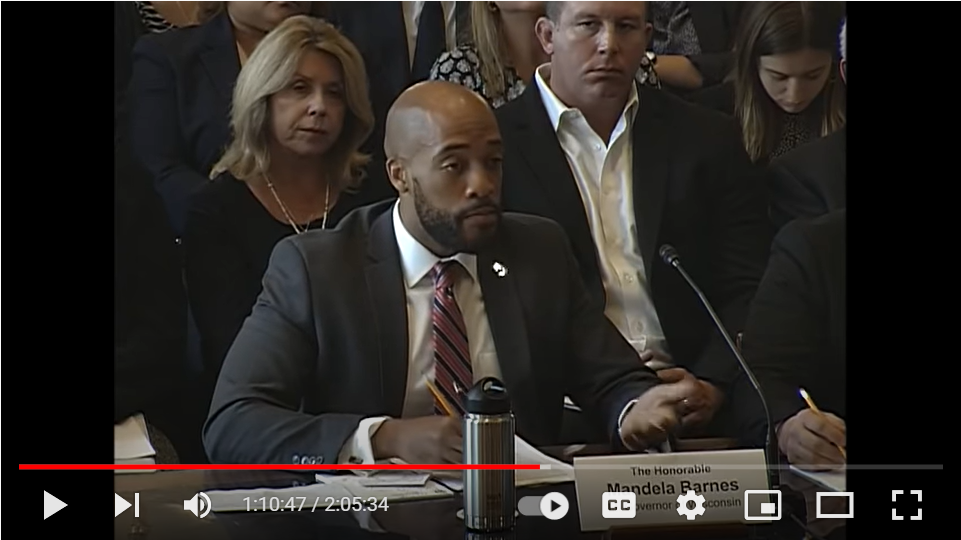Mississippi Today
WWE wrestler fights new federal indictment in welfare scandal, which his attorney calls ‘armchair quarterbacking’
WWE wrestler fights new federal indictment in welfare scandal, which his attorney calls ‘armchair quarterbacking’
Former WWE wrestler Ted “Teddy” DiBiase Jr. was sitting on the front row behind former Mississippi welfare director John Davis while the now disgraced government bureaucrat testified before Congress in 2019.
Davis, who was at the time admittedly orchestrating a stunning welfare fraud scheme, was telling members of the U.S. House of Representatives Committee on Agriculture about the supposedly life changing work his department was conducting instead of making food assistance available to more Mississippians.
“We know that it takes investment in our staff through things like Law of 16,” Davis told congress members, “which is our personal and professional development programs for our staff members, to then replicate that over with our clients to make sure that they are empowered to be whom they have been called to be.”

Law of 16 was DiBiase Jr.’s nebulous motivational speaking series, one of the projects for which he received roughly $3 million in federal welfare funds from Temporary Assistance for Needy Families (TANF) and The Emergency Food Assistance Program.
Today, nearly four years after the director spoke openly in the nation’s capital about his work, DiBiase Jr. is facing criminal charges for the first time within the larger unfolding welfare scandal, in which officials stole or misspent tens of millions of federal public assistance funds.
He pleaded not guilty and if convicted on all counts in the indictment unsealed Thursday, DiBiase Jr. faces a maximum penalty of up to 175 years in prison.
“It was the government that chose to run this program this way. And it was not a secret. This was done in front of everybody. It was done in front of the United States Congress. This was not a secret. This was not, as the federal law would say, a scheme or artifice to defraud,” Scott Gilbert, DiBiase Jr.’s criminal defense attorney, told Mississippi Today two weeks ago. “So what we’re doing now, for the most part, is second guessing and armchair quarterbacking the way government was run. And that’s not what the criminal law is for.”
This indictment, handed down by a federal grand jury, is the first that the U.S. Attorney’s Office has secured in the welfare case. Each of the other five federal defendants pleaded guilty to bills of information, which are used when a defendant chooses to plead guilty without the case going to a grand jury.
READ MORE: The Backchannel Series
DiBiase Jr. joins his younger brother Brett DiBiase, who also received hundreds of thousands in welfare funds, to become the eighth person to be charged criminally within the scandal, including those only charged in state court. DiBiase Jr., his brother and their father, former WWE star Ted “The Million Dollar Man” DiBiase, are all facing civil charges in a parallel lawsuit Mississippi Department of Human Services has filed against nearly four dozen people or organizations. DiBiase Sr. has not faced criminal charges.
Under the new indictment, DiBiase Jr. faces 13 criminal counts under Title 18 of the U.S. Code, the main criminal code of the federal government, ranging from conspiracy, wire fraud, theft of federal funds and money laundering.
“It’s ironic that he was involved with the Law of 16, a questionable program at best, because he’s now going to get familiar with the Law of 18, which is Title 18 of the U.S. Code,” quipped current Mississippi Department of Human Services Director Bob Anderson, a former prosecutor tapped by Gov. Tate Reeves to lead the welfare agency after the scandal broke in 2020.
Anderson has said he is cooperating with the federal authorities in their ongoing investigation for his entire tenure at MDHS.
“I believe they will do everything to bring all additional charges they think are appropriate in this case,” he added after DiBiase Jr.’s arraignment Thursday.
Prosecutors say DiBiase Jr. secured at least five “sham contracts” in 2017 and 2018 with two nonprofits, Mississippi Community Education Center and Family Resource Center of North Mississippi, who were receiving tens of millions of federal welfare funds to run a statewide anti-poverty initiative called Families First for Mississippi. The directors of those nonprofits, Nancy New and Christie Webb, have both pleaded guilty within the scheme.
Davis and DiBiase Jr. met after the director initially hired his younger brother, Brett DiBiase, in an executive level position at MDHS in 2017, despite him lacking qualifications for the job. Davis became close with the DiBiase brothers, first Brett and then Teddy. Their communication reflects a familial relationship in which they discussed their faith, hardships, and told each other, “I love you.”
Davis retired from office in mid-2019, shortly after the D.C. trip, after his deputy, Jacob Black, who is facing his own charges in the parallel civil suit, brought a tip of suspected fraud to former Gov. Phil Bryant. In the months leading up to his ousting, Davis expressed concern that his relationship with DiBiase Jr. had weakened.
“I hate that you feel that way,” DiBiase Jr. wrote to Davis in a March 2019 text message. “… You definitely don’t have to ‘chase’ after me … Just want you to know I love you dearly, and I’m so grateful for your friendship.”
In its civil suit, MDHS alleges DiBiase Jr. “exploited his close relationship with John Davis to further enrich his family and friends.”
Under Davis’ direction, the nonprofits made up front payments to DiBiase Jr. “regardless of whether any work had been performed and knowing that no work likely ever would be performed,” the new indictment alleges.
The nonprofits hired DiBiase Jr. to perform vague services — such as leadership outreach, addressing the needs of inner city youth and assessing the need for emergency food assistance — with little requirement of outcomes.
But according to audit reports, interviews and a review of communication, Davis frequently required DiBiase Jr. to accompany him in his day-to-day executive meetings and tasks, interrupting DiBiase Jr.’s duties under the contract.

“It’s just sort of bizarre to think of the executive director of the Department of Human Services actually conducting himself on a regular basis in ways that thwart and interfere with the ability of the contractor to do the work. But that’s exactly what went on, on a regular basis,” Gilbert said.
“You’ve got a guy who’s here that’s trying to perform and do what he’s supposed to do, and to a large extent he does,” Gilbert said. “And then you’ve got this person running MDHS that for whatever reason feels like the best use of Teddy’s time is not to perform his contracts, but to follow him around to meetings and to other events and things like that. And it just, it’s nonsensical. … I don’t know of anybody that understands really what that was about other than just, it’s just pure absurdity.”
The indictment alleges that the money that went to DiBiase Jr. “were diverted from needy families and low-income individuals in Mississippi.”
However, states have long legally diverted funds from the national Temporary Assistance for Needy Families program away from families in need. Since welfare reform in the 90’s, when TANF was created, states have used the lax guidelines in federal statute to shrink the side of the program that provides monthly cash assistance, known as the welfare check, and put the money instead into other programs or pet projects.
Even today, Mississippi’s welfare agency uses only about 5% of its TANF block grant on the welfare check.
While the other TANF programs are supposed to serve one of three other goals — promoting job preparation and marriage, preventing out-of-wedlock pregnancies and encouraging two-parent families — the federal government provides virtually no oversight to ensure that the programs supported by these funds actually correspond with these goals.
In the case of the Mississippi welfare scandal, which involves officials using $5 million in TANF funds to build a volleyball stadium at University of Southern Mississippi, the spending had become especially egregious.
The indictment alleges DiBiase Jr. used the federal funds he received to buy himself a vehicle and a boat and to put a down payment on a roughly $1.5 million lakeside home in the Madison community of Reunion, which the federal government has since seized.
Gilbert is confident the federal government doesn’t have a viable case against his client. He says there are several problems with the prosecution’s legal theory. In the welfare fraud case, prosecutors have used a specific theft or bribery statute, 18 U.S. Code § 666, which applies to agents of an organization or agency that receives federal funds obtaining funding by fraud. Two of DiBiase Jr.’s 13 counts fall under this statute. Gilbert said his client cannot be charged with this crime since he was not an agent of an organization that received federal funds. He makes the distinction that because DiBiase Jr. was a contractor under the nonprofit, not the state agency, he was never an agent of the federal funds.
Gilbert also contests the government’s claim that DiBiase Jr.’s contracts were a “sham.” DiBiase Jr. did conduct work under the contracts, Gilbert said, and any work he did not conduct was as a result of Davis’ interference.
“The big issue from a criminal defense perspective is: Did someone obtain money or property from the government by being dishonest? And what I can tell you in this case is, these contracts, the work that was done, I’ve yet to see a single shred of evidence that would show that Teddy DiBiase was dishonest with anybody about anything in order to get these contracts. These contracts were awarded to him. They came to him. He didn’t solicit anything from MDHS. He undertook these contracts and attempted to perform the work.”
“So what this boils down to is do people feel like this was an appropriate use of TANF money or other money to carry out the function of government?” Gilbert continued. “That’s a fair question, and that’s a question that reasonable people absolutely can disagree about. But it’s not a crime. You resolve your dissatisfaction with the way the government functions at the polling place.”
This article first appeared on Mississippi Today and is republished here under a Creative Commons license.
Mississippi Today
Trump nominates Baxter Kruger, Scott Leary for Mississippi U.S. attorney posts
President Donald Trump on Tuesday nominated Baxter Kruger to become Mississippi’s new U.S. attorney in the Southern District and Scott Leary to become U.S. attorney for the Northern District.
The two nominations will head to the U.S. Senate for consideration. If confirmed, the two will oversee federal criminal prosecutions and investigations in the state.
Kruger graduated from the Mississippi College School of Law in 2015 and was previously an assistant U.S. attorney for the Southern District. He is currently the director of the Mississippi Office of Homeland Security.
Sean Tindell, the Mississippi Department of Public Safety commissioner, oversees the state’s Homeland Security Office. He congratulated Kruger on social media and praised his leadership at the agency.
“Thank you for your outstanding leadership at the Mississippi Office of Homeland Security and for your dedicated service to our state,” Tindell wrote. “Your hard work and commitment have not gone unnoticed and this nomination is a testament to that!”
Leary graduated from the University of Mississippi School of Law, and he has been a federal prosecutor for most of his career.
He worked for the U.S. Attorney’s Office in the Western District of Tennessee in Memphis from 2002 to 2008. Afterward, he worked at the U.S. Attorney’s Office for the Northern District of Mississippi in Oxford, where he is currently employed.
Leary told Mississippi Today that he is honored to be nominated for the position, and he looks forward to the Senate confirmation process.
This article first appeared on Mississippi Today and is republished here under a Creative Commons Attribution-NoDerivatives 4.0 International License.
The post Trump nominates Baxter Kruger, Scott Leary for Mississippi U.S. attorney posts appeared first on mississippitoday.org
Note: The following A.I. based commentary is not part of the original article, reproduced above, but is offered in the hopes that it will promote greater media literacy and critical thinking, by making any potential bias more visible to the reader –Staff Editor.
Political Bias Rating: Centrist
This article presents a straightforward news report on President Donald Trump’s nominations of Baxter Kruger and Scott Leary for U.S. attorney positions in Mississippi. It focuses on factual details about their backgrounds, qualifications, and official responses without employing loaded language or framing that favors a particular ideological perspective. The tone is neutral, with quotes and descriptions that serve to inform rather than persuade. While it reports on a political appointment by a Republican president, the coverage remains balanced and refrains from editorializing, thus adhering to neutral, factual reporting.
Mississippi Today
Jackson’s performing arts venue Thalia Mara Hall is now open
After more than 10 months closed due to mold, asbestos and issues with the air conditioning system, Thalia Mara Hall has officially reopened.
Outgoing Mayor Chokwe A. Lumumba announced the reopening of Thalia Mara Hall during his final press conference held Monday on the arts venue’s steps.
“Today marks what we view as a full circle moment, rejoicing in the iconic space where community has come together for decades in the city of Jackson,” Lumumba said. “Thalia Mara has always been more than a venue. It has been a gathering place for people in the city of Jackson. From its first class ballet performances to gospel concerts, Thalia Mara Hall has been the backdrop for our city’s rich cultural history.”
Thalia Mara Hall closed last August after mold was found in parts of the building. The issues compounded from there, with malfunctioning HVAC systems and asbestos remediation. On June 6, the Mississippi State Fire Marshal’s Office announced that Thalia Mara Hall had finally passed inspection.
“We’re not only excited to have overcome many of the challenges that led to it being shuttered for a period of time,” Lumumba said. “We are hopeful for the future of this auditorium, that it may be able to provide a more up-to-date experience for residents, inviting shows that people are able to see across the world, bringing them here to Jackson. So this is an investment in the future.”
In total, Emad Al-Turk, a city contracted engineer and owner of Al-Turk Planning, estimates that $5 million in city and state funds went into bringing Thalia Mara Hall up to code.
The venue still has work to be completed, including reinstalling the fire curtain. The beam in which the fire curtain will be anchored has asbestos in it, so it will have to be remediated. In addition, a second air-conditioning chiller needs to be installed to properly cool the building. Until it’s installed, which could take months, Thalia Mara Hall will be operating at a lower seating capacity of about 800.
“Primarily because of the heat,” Al-Turk said. “The air conditioning would not be sufficient to actually accommodate the 2,000 people at full capacity, but starting in the fall, that should not be a problem.”
Al-Turk said the calendar is open for the city to begin booking events, though none have been scheduled for July.
“We’re very proud,” he said. “This took a little bit longer than what we anticipated, but we had probably seven or eight different contractors we had to coordinate with and all of them did a superb job to get us where we are today.”
This article first appeared on Mississippi Today and is republished here under a Creative Commons Attribution-NoDerivatives 4.0 International License.
The post Jackson’s performing arts venue Thalia Mara Hall is now open appeared first on mississippitoday.org
Note: The following A.I. based commentary is not part of the original article, reproduced above, but is offered in the hopes that it will promote greater media literacy and critical thinking, by making any potential bias more visible to the reader –Staff Editor.
Political Bias Rating: Centrist
The article presents a straightforward report on the reopening of Thalia Mara Hall in Jackson, focusing on facts and statements from city officials without promoting any ideological viewpoint. The tone is neutral and positive, emphasizing the community and cultural significance of the venue while detailing the challenges overcome during renovations. The coverage centers on public investment and future prospects, without partisan framing or editorializing. While quotes from Mayor Lumumba and a city engineer highlight optimism and civic pride, the article maintains balanced, factual reporting rather than advancing a political agenda.
Mississippi Today
‘Hurdles waiting in the shadows’: Lumumba reflects on challenges and triumphs on final day as Jackson mayor
On his last day as mayor of Jackson, Chokwe Antar Lumumba recounted accomplishments, praised his executive team and said he has no plans to seek office again.
He spoke during a press conference outside of the city’s Thalia Mara Hall, which was recently cleared for reopening after nearly a year of remediation. The briefing, meant to give media members a peek inside the downtown theater, marked one of Lumumba’s final forays as mayor.
Longtime state Sen. John Horhn — who defeated Lumumba in the Democratic primary runoff — will be inaugurated as mayor Tuesday, but Lumumba won’t be present. Not for any contentious reason, the 42-year-old mayor noted, but because he returns to his private law practice Tuesday.
“I’ve got to work now, y’all,” Lumumba said. “I’ve got a job.”
Thalia Mara Hall’s presumptive comeback was a fitting end for Lumumba, who pledged to make Jackson the most radical city in America but instead spent much of his eight years in office parrying one emergency after another. The auditorium was built in 1968 and closed nearly 11 months ago after workers found mold caused by a faulty HVAC system – on top of broken elevators, fire safety concerns and vandalism.
“This job is a fast-pitched sport,” Lumumba said. “There’s an abundance of challenges that have to be addressed, and it seems like the moment that you’ve gotten over one hurdle, there’s another one that is waiting in the shadows.”
Outside the theater Monday, Lumumba reflected on the high points of his leadership instead of the many crises — some seemingly self-inflicted — he faced as mayor.
He presided over the city during the coronavirus pandemic and the rise in crime it brought, but also the one-two punch of the 2021 and 2022 water crises, exacerbated by the city’s mismanagement of its water plants, and the 18-day pause in trash pickup spurred by Lumumba’s contentious negotiations with the city council in 2023.
Then in 2024, Lumumba was indicted alongside other city and county officials in a sweeping federal corruption probe targeting the proposed development of a hotel across from the city’s convention center, a project that has remained stalled in a 20-year saga of failed bids and political consternation.
Slated for trial next year, Lumumba has repeatedly maintained his innocence.
The city’s youngest mayor also brought some victories to Jackson, particularly in his first year in office. In 2017, he ended a furlough of city employees and worked with then-Gov. Phil Bryant to avoid a state takeover of Jackson Public Schools. In 2019, the city successfully sued German engineering firm Siemens and its local contractors for $89 million over botched work installing the city’s water-sewer billing infrastructure.
“I think that that was a pivotal moment to say that this city is going to hold people responsible for the work that they do,” Lumumba said.
Lumumba had more time than any other mayor to usher in the 1% sales tax, which residents approved in 2014 to fund infrastructure improvements.
“We paved 144 streets,” he said. “There are residents that still are waiting on their roads to be repaved. And you don’t really feel it until it’s your street that gets repaved, but that is a significant undertaking.”
And under his administration, crime has fallen dramatically recently, with homicides cut by a third and shootings cut in half in the last year.
Lumumba was first elected in 2017 after defeating Tony Yarber, a business-friendly mayor who faced his own scandals as mayor. A criminal justice attorney, Lumumba said he never planned to seek office until the stunning death of his father, Chokwe Lumumba Sr., eight months into his first term as mayor in 2014.
“I can say without reservation, and unequivocally, we remember where we started. We are in a much better position than we started,” Lumumba said.
Lumumba said he has sat down with Horhn in recent months, answered questions “as extensively as I could,” and promised to remain reachable to the new mayor.
This article first appeared on Mississippi Today and is republished here under a Creative Commons Attribution-NoDerivatives 4.0 International License.
The post 'Hurdles waiting in the shadows': Lumumba reflects on challenges and triumphs on final day as Jackson mayor appeared first on mississippitoday.org
Note: The following A.I. based commentary is not part of the original article, reproduced above, but is offered in the hopes that it will promote greater media literacy and critical thinking, by making any potential bias more visible to the reader –Staff Editor.
Political Bias Rating: Center-Left
The article reports on outgoing Jackson Mayor Chokwe Antar Lumumba’s reflections without overt editorializing but subtly frames his tenure within progressive contexts, emphasizing his self-described goal to make Jackson “the most radical city in America.” The piece highlights his accomplishments alongside challenges, including public crises and a federal indictment, maintaining a factual tone yet noting contentious moments like labor disputes and governance issues. While it avoids partisan rhetoric, the focus on social justice efforts, infrastructure investment, and crime reduction, as well as positive framing of Lumumba’s achievements, aligns with a center-left perspective that values progressive governance and accountability.
-
News from the South - Georgia News Feed6 days ago
Are you addicted to ‘fridge cigarettes’? Here’s what the Gen Z term means
-
Local News7 days ago
St. Martin trio becomes the first females in Mississippi to sign Flag Football Scholarships
-
News from the South - Oklahoma News Feed7 days ago
RFK Jr. Brings MAHA to Oklahoma
-
News from the South - South Carolina News Feed6 days ago
Federal investigation launched into Minnesota after transgender athlete leads team to championship
-
News from the South - Tennessee News Feed5 days ago
Democratic resolution to block military action in Iran fails to advance in US Senate
-
The Center Square5 days ago
U.S. Senate prepares for passage of One Big Beautiful Bill Act | National
-
News from the South - Virginia News Feed7 days ago
‘Hallowed ground, desecrated’: ICE sweeps at Chesterfield court draw fierce backlash
-
News from the South - Florida News Feed7 days ago
US Supreme Court allows SC to remove Planned Parenthood from list of Medicaid providers















































